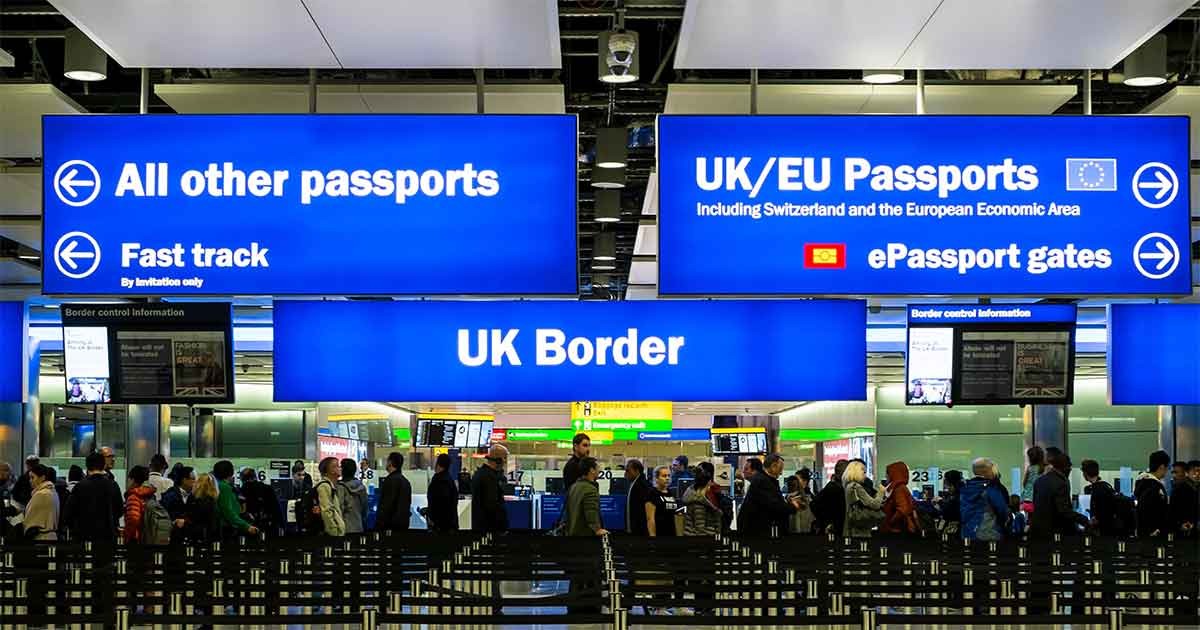 |
| UK Border Control (Image: fullfact.org) |
The Conservative Party's pledge that net migration will be reduced to tens of thousands is soon becoming a reality - well, sort of. This may sound like a bold statement, but think of this as a prediction for what is to come in the next 5-7 years for European Union (EU) citizens in particular. Yet, this will not be thanks to the Tories vision, neither would it really be down to the reported increased levels of 'hate crimes' aimed at Eastern Europeans over the past year.
The reason I'm arguing here is purely economic. This aspect of the immigration debate is rarely discussed. Immigration is a highly emotive topic in which both sides of the argument will often agree to disagree. You'll often hear someone state there are 'too many' immigrants coming to the UK while another would counter that by stating that they're a total asset, performing employment duties no Brit would want to do.
Both sides of the debate are completely entitled to their viewpoints. Yet, if we simmered the emotion, there is a case that both arguments are correct. The UK has seen larger-than-usual numbers of people from a particular country immigrating to the country for years. At the same time, they do contribute to the British economy with their invaluable skills. Where most of us unite, however, is the acknowledgement that immigration is a serious matter, and politicians find it far too easy to give their expert view.
Despite this, nobody has really considered the key economics when it comes to immigration. The Conservatives, who have set a tens of thousands net target, suggest 'tougher borders' without showcasing what this actually looks like. They have been in power long enough to do so, yet net migration still lingers around the +275,000-325,000 mark. Recent statistics show the rate has lowered slightly, but nowhere near their goal first pledged in 2010. In the general election just concluded, they're still sticking to the same target by adding this to their manifesto. What they should be doing is wait.
| Theresa May with her 2017 manifesto (Image: ITV) |
Patience, indeed, is the name of the game. From an EU perspective, experts need to look at the trends of particular nations, and correlate the year that country became a member to how their economy has coped over the years since. Here, I've done a little bit of analysis of Poland, Bulgaria and Romania - three countries who have been under heavy British media scrutiny over the past decade.
Poland became an EU member in 2004 and the number of Polish-born living the UK has soared since - up by almost 750,000 in eleven years (up to 2015). Yet, 2016 has seen these numbers dip with analysts predicting this trend to continue. Could the UK leaving the EU be a consequence of this? Perhaps, but for me, I see this is an excuse heightened by the media.
Net migration in Poland remains in the minuses, in 2014, it was -14,800. However, this rate has increased in recent years - it was -7,618 in 2016. While I have no doubt, UK's imminent EU exit was a reason to those not wanting to leave their home country, however when you look at the Polish economy today, you'll see why not as many plan to migrate away from home.
In recent years, GDP growth in Poland has rocketed with the rate not likely to die down any time soon, so long as their government keeps focus. The build-up to Poland joining the EU was good. In 2005 however, GDP growth was reduced - largely due to the first hefty EU membership bill they had to pay, but also net migration dropped in its most alarming rate. It was also down in 2008-9 during the global economic crisis, but which country didn't feel this pinch then?
 |
| Media sceptics of mass migration (Image: Buzzfeed) |
This trend continues with Bulgaria and Romania, though their situations were different to that of Poland. Bulgaria and Romania joined the EU in 2007, a year before the global economic turmoil, and their residents right to work anywhere in Europe wasn't introduced until 2013 so their net migration surges differed to that of Poland.
Like Poland, Romania's economy in the build-up to joining the EU was good, but they ultimately felt the pinch in 2009 with GDP growth of -7.067%, down drastically from +8.49% the previous year. Having received their first EU bill must have been a financial shock for them too. Their economy has recovered somewhat since, with GDP per capita increasing from 6,579 euros in 2011 to 8,059 in 2015. GDP growth in Romania in 2015 was +3.5%. And while their economy has improved, less Romanians are leaving. Net migration has increased from -174,900 in 2010 to -43,720 in 2016.
Regarding Bulgaria, even talk of them gaining membership to the EU was exactly what they needed. The 1990s proved to be a difficult decade but prior to 2007, they were financially stable. After 2009, they have found further stability, however, their GDP growth doesn't fare as great compared to Romania and Poland due to its population which is less than that of London. That said, their net migration is also increasing, from -16,600 in 2010 to -10,000 in 2016. So while these countries mentioned have more leaving than staying, this is becoming less apparent.
The economic benefits in joining the EU aren't clearly seen overnight. Poland, Bulgaria and Romania only have gone through what other countries entering the single market had to endure. The UK in 1974, when they joined the membership, had GDP growth of -2.473%. It wasn't until two years later until they found themselves in positive territory. Once you pay the bill for the second and third time, it would get easier - after getting your economic priorities straight. Net migration for the UK was nearly -100,000 in 1974 and it wasn't until 1994 until it reached the plus margin and never looked back. This is something the three Eastern European nations mentioned can look forward to, in time.
The UK is an attractive nation for work, health and lifestyle so no doubt they'll be the centre point of mass immigration. For those unhappy about it should realise it is temporary, even if it seems a lifetime. We aren't likely to see an influx of new European countries joining the EU anytime soon for us to be speculating otherwise. Sceptics should also realise the reason why those Eastern European countries, currently not members of the EU, may want to join. They realise their economic situation isn't reflected in their people's pockets. So once their membership application is granted, they are part of a cycle where governments agree key trade deals (which could take years to materialise) and large chunks of the population move abroad, applying their skills to places which need such candidates. In time, they'd return home and be part of a new economy that suits them. So, for those dying to see net migration lowered, be patient.
Comments
Post a Comment